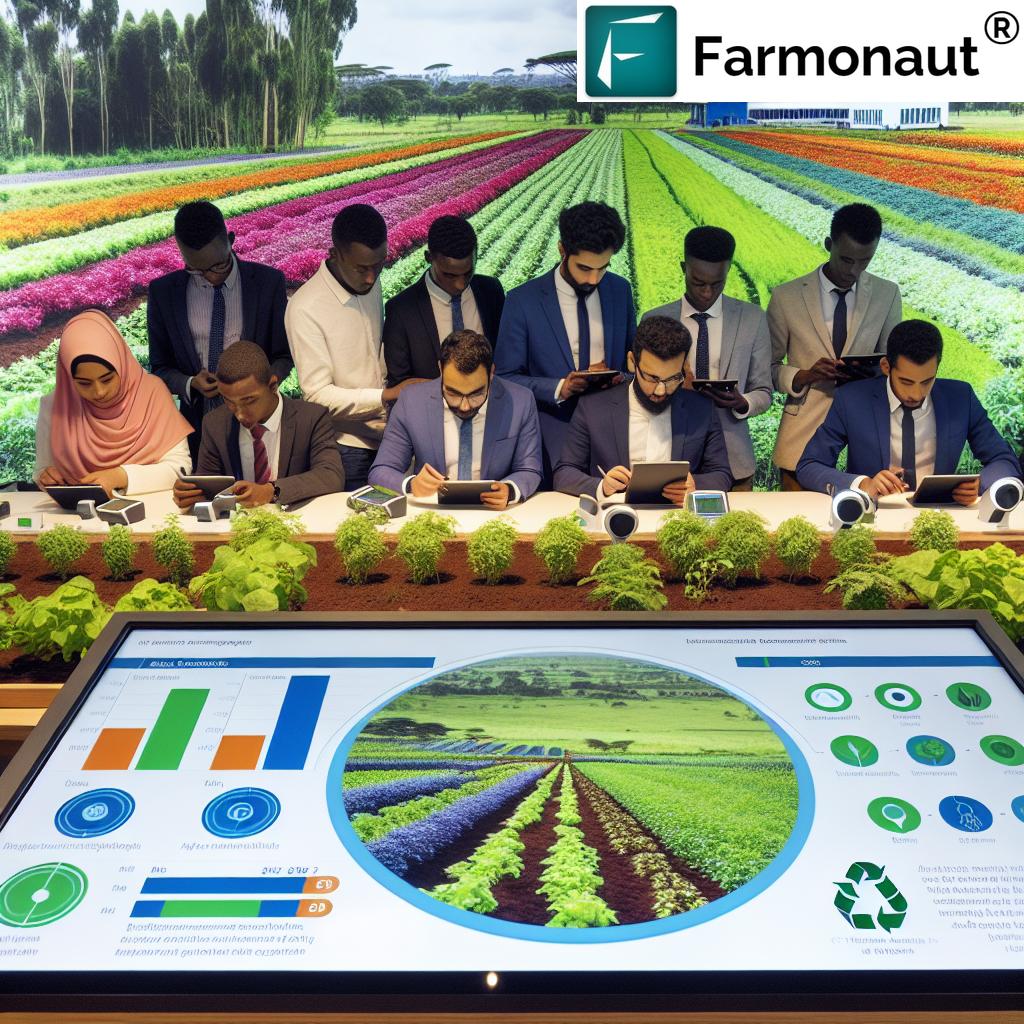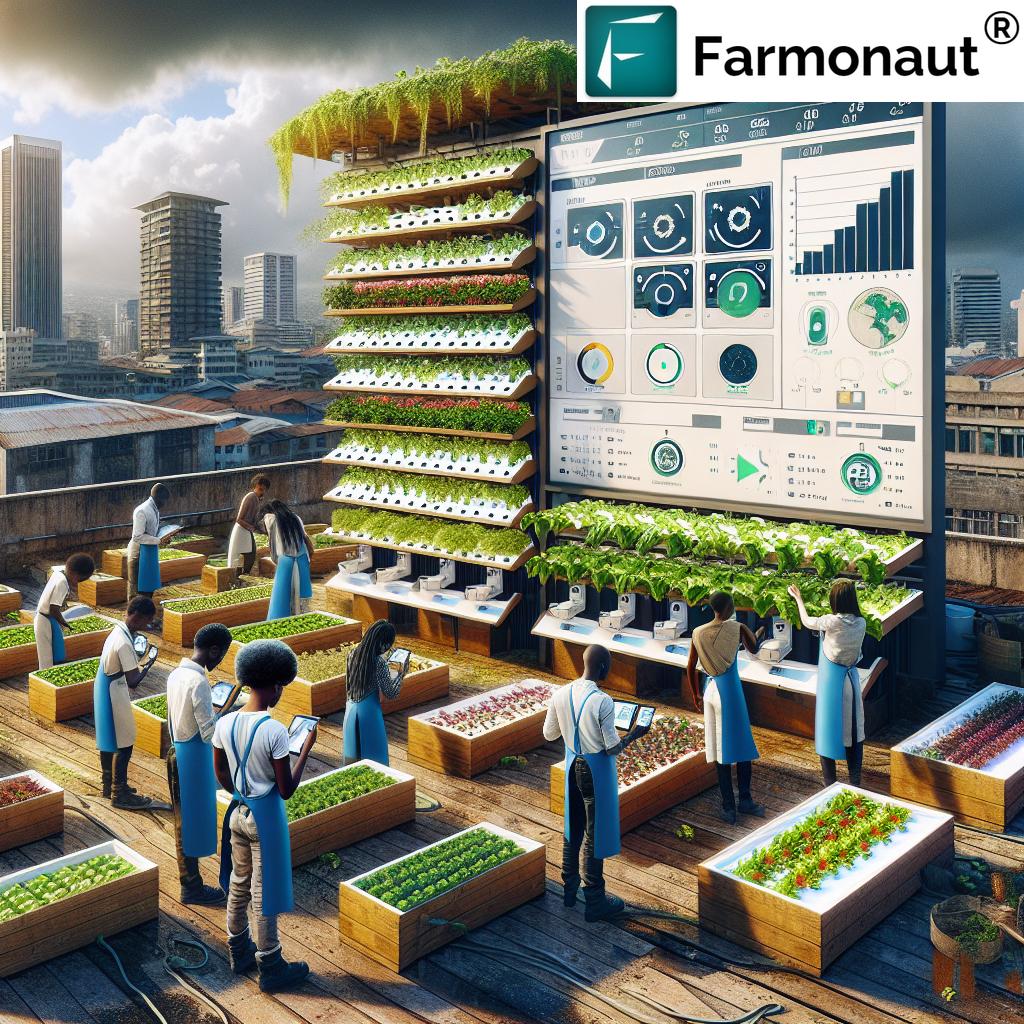Revolutionizing Kenyan Agriculture: Smart Farming Solutions and Precision Technology Boost Productivity at Machakos University
“Machakos University students developed a hand-held device that analyzes soil nutrients and moisture, optimizing crop selection for Kenyan farmers.”
In the heart of Kenya, a technological revolution is unfolding that promises to transform the face of agriculture across the nation and potentially the entire African continent. At Machakos University, located southeast of the bustling capital Nairobi, students and faculty are at the forefront of developing smart farming solutions and precision agriculture technologies that are set to boost productivity and sustainability in the agricultural sector.
We are witnessing a paradigm shift in how farming is approached in Kenya, with innovative tools and techniques being developed to address longstanding challenges faced by farmers. From soil nutrient analysis to water conservation strategies, these advancements are paving the way for a more efficient and productive agricultural landscape.
The Luban Workshop: A Hub of Innovation
At the center of this agricultural revolution is the Luban Workshop at Machakos University. This state-of-the-art facility, established in 2019 as part of China’s commitment to international vocational education through the Belt and Road Initiative, has become a crucible for technological innovation and practical skills development.
The workshop has been instrumental in providing hands-on technological training to approximately 600 students since its inception. It’s one of 17 such workshops set up across 15 African countries, with Kenya hosting two – the second being at Meru University of Science and Technology, northwest of Machakos.

Cutting-Edge Technologies for Precision Agriculture
One of the most promising innovations to emerge from the Luban Workshop is a hand-held device designed to revolutionize soil nutrient analysis and crop selection. Spearheaded by Dickson Esamai, a fifth-year electrical and electronics engineering student, this tool embodies the essence of precision agriculture technology.
- Soil Nutrient Analysis: The device allows farmers to quickly assess soil nutrient levels, enabling them to make informed decisions about crop selection and fertilization strategies.
- Moisture Sensors: Integrated sensors measure soil moisture content, crucial for optimizing irrigation and promoting water conservation in agriculture.
- Mobile Information Systems: To cater to smallholder farmers without smartphones, the device can send vital farming information via text messages to basic mobile phones.
This innovation is a prime example of how agricultural productivity enhancement can be achieved through smart farming solutions. By providing farmers with precise data about their soil and crops, we’re enabling them to make decisions that can significantly improve yields while conserving resources.
Cloud Computing and AI: The Backbone of Modern Agriculture
The Luban Workshop’s success is greatly attributed to its advanced infrastructure, particularly the impressive data storage capacities provided by Huawei cloud technology. This robust cloud computing foundation enables students to develop sophisticated tools and applications that require significant processing power and data management capabilities.
Artificial Intelligence (AI) is playing an increasingly important role in these agricultural innovations. For instance:
- Predictive analytics for crop yields
- Automated pest and disease detection
- AI-driven irrigation systems
These AI applications are not limited to agriculture. Mark Omaiko, another student at the workshop, is developing a cloud-integrated safari system that uses AI to help tourists select wildlife sites in Kenya, showcasing the versatility of the skills being developed at the Luban Workshop.
Empowering Smallholder Farmers Through Technology
“A mobile agriculture information system in Kenya sends crucial farming data via text messages to smallholder farmers, enhancing productivity.”
One of the most significant impacts of these technological advancements is their potential to empower smallholder farmers, who form the backbone of Kenyan agriculture. The mobile agriculture information systems being developed at Machakos University are particularly noteworthy in this regard.
- Accessible Information: By sending crucial farming data via text messages, even farmers with basic mobile phones can benefit from up-to-date agricultural insights.
- Timely Alerts: Weather forecasts, pest outbreak warnings, and market price information can be disseminated quickly and efficiently.
- Customized Advice: Based on the data collected from the hand-held soil analysis devices, farmers can receive personalized recommendations for their specific plots.
This democratization of agricultural knowledge is a game-changer for rural communities, potentially leading to significant improvements in crop yields and farmer incomes across Kenya.
Water Conservation: A Critical Focus
In a country where water scarcity is a pressing issue, the emphasis on water conservation in agriculture cannot be overstated. The soil moisture sensors integrated into the hand-held devices developed at Machakos University play a crucial role in this regard.
- Precision Irrigation: By providing accurate soil moisture data, farmers can implement precision irrigation techniques, applying water only when and where it’s needed.
- Drought Resilience: Improved water management practices enhance crops’ resilience to drought conditions.
- Sustainable Farming: Efficient water use contributes to more sustainable farming practices overall.
These water conservation strategies are essential for the long-term viability of Kenyan agriculture, especially in the face of climate change and increasing water stress.

Urban Farming Innovations
While much of the focus is on traditional rural farming, the Luban Workshop is also fostering innovations in urban agriculture. Ian Omwenga Ombaki, another student at Machakos University, is developing an automated hydroponics system aimed at promoting urban farming.
- Space-Efficient: Hydroponics systems allow for crop cultivation in limited urban spaces.
- Water-Efficient: These systems typically use significantly less water than traditional soil-based farming.
- Year-Round Production: Controlled environments enable continuous crop production regardless of external weather conditions.
This focus on urban farming innovations addresses food security concerns in Kenya’s rapidly growing cities, providing a potential solution for sustainable urban food production.
Vocational Education: Bridging the Skills Gap
The Luban Workshop initiative is not just about developing new technologies; it’s also about equipping students with the practical skills needed in the modern workforce. This focus on vocational education is crucial for bridging the skills gap in Kenya’s agricultural and technology sectors.
- Hands-On Learning: Students gain practical experience with cutting-edge tools and technologies.
- Industry-Relevant Skills: The curriculum is designed to align with market needs, ensuring graduates are well-prepared for the workforce.
- Entrepreneurial Mindset: Students are encouraged to develop innovative solutions to real-world problems, fostering an entrepreneurial spirit.
This approach to education is transforming the landscape of agricultural training in Kenya, producing a new generation of tech-savvy farmers and agri-entrepreneurs.
The Role of Satellite Technology in Precision Agriculture
While the innovations at Machakos University are groundbreaking, it’s worth noting that they complement existing technologies in the field of precision agriculture. Satellite-based farm management solutions, for instance, play a crucial role in providing a macro-level view of agricultural landscapes.
Companies like Farmonaut are at the forefront of making such technologies accessible to farmers. Through their web and mobile applications, farmers can access valuable insights derived from satellite imagery and advanced analytics.
- Crop Health Monitoring: Satellite imagery allows for large-scale monitoring of crop health, providing early warnings of potential issues.
- Yield Prediction: Advanced algorithms can predict crop yields based on historical data and current conditions.
- Resource Optimization: Farmers can optimize their use of water, fertilizers, and other inputs based on precise data about their fields.
For those interested in integrating such technologies into their own systems, Farmonaut offers an API with comprehensive developer documentation.
The Future of Kenyan Agriculture
As we look to the future, it’s clear that the innovations being developed at Machakos University and other institutions across Kenya have the potential to transform the country’s agricultural sector. By combining traditional farming knowledge with cutting-edge technology, Kenya is positioning itself as a leader in smart farming solutions across Africa.
- Increased Productivity: Precision agriculture technologies promise to significantly boost crop yields.
- Sustainable Practices: Innovations in water conservation and resource management promote more sustainable farming methods.
- Economic Growth: A more efficient agricultural sector can drive economic growth and improve food security.
- Knowledge Transfer: These technologies and practices have the potential to benefit other African countries facing similar agricultural challenges.
The journey towards a technologically advanced agricultural sector in Kenya is well underway, and the future looks promising indeed.
Kenyan Agricultural Innovations Comparison
| Innovation Type | Application | Benefits | Target Users |
|---|---|---|---|
| Hand-held Soil Analysis Device | Analyzes soil nutrients and moisture levels | Optimizes crop selection and resource use | Smallholder and commercial farmers |
| Mobile Agriculture Information System | Sends farming data via text messages | Improves decision-making for farmers without smartphones | Smallholder farmers |
| Automated Hydroponics System | Enables soilless crop cultivation in urban settings | Promotes urban farming and food security | Urban farmers and households |
| AI-Driven Safari System | Assists tourists in selecting wildlife sites | Enhances tourism experience and wildlife conservation | Tourists and wildlife management agencies |
| Satellite-Based Farm Management | Provides macro-level view of agricultural landscapes | Enables large-scale crop monitoring and yield prediction | Commercial farmers and agricultural organizations |
Embracing Digital Solutions in Agriculture
As we’ve seen, the future of Kenyan agriculture is increasingly digital. For farmers and agricultural professionals looking to leverage these technologies, there are several options available:
- Mobile Applications: Apps like Farmonaut provide easy access to satellite-based farm management tools.


- Web Applications: For those preferring to work on larger screens, web-based platforms offer comprehensive farm management capabilities.

- API Integration: Developers and agribusinesses can integrate satellite data and analytics into their own systems using APIs.
These digital tools complement the innovations being developed at institutions like Machakos University, providing a comprehensive ecosystem of smart farming solutions.
Conclusion
The agricultural revolution unfolding at Machakos University and across Kenya is a testament to the power of innovation and education. By combining cutting-edge technology with practical skills development, Kenya is paving the way for a more productive, sustainable, and resilient agricultural sector.
From hand-held soil analysis devices to satellite-based farm management systems, the range of tools available to Kenyan farmers is expanding rapidly. These innovations promise not only to boost agricultural productivity but also to address critical challenges such as water conservation and food security.
As we look to the future, it’s clear that the success of Kenyan agriculture will depend on the widespread adoption of these smart farming solutions. By embracing these technologies and continuing to innovate, Kenya has the potential to become a model for agricultural development across Africa and beyond.
FAQ
- Q: What is precision agriculture?
A: Precision agriculture is an approach to farm management that uses information technology to ensure that crops and soil receive exactly what they need for optimum health and productivity. - Q: How does the hand-held device developed at Machakos University work?
A: The device analyzes soil nutrients and moisture levels, providing farmers with data to make informed decisions about crop selection and resource management. - Q: Can smallholder farmers benefit from these technologies?
A: Yes, many of the innovations, such as the mobile agriculture information system, are specifically designed to be accessible to smallholder farmers. - Q: What role does AI play in these agricultural innovations?
A: AI is used in various applications, including predictive analytics for crop yields, automated pest detection, and optimizing irrigation systems. - Q: How does satellite technology contribute to precision agriculture?
A: Satellite technology provides large-scale monitoring of crop health, enables yield prediction, and helps in optimizing resource use across vast agricultural areas.



